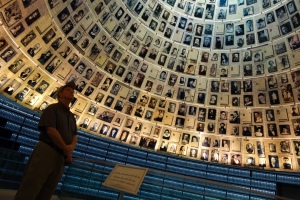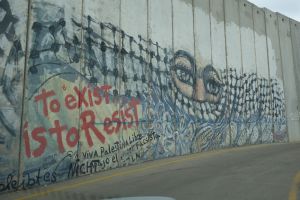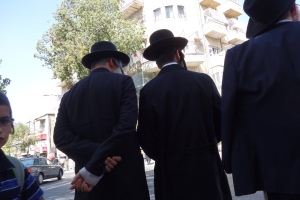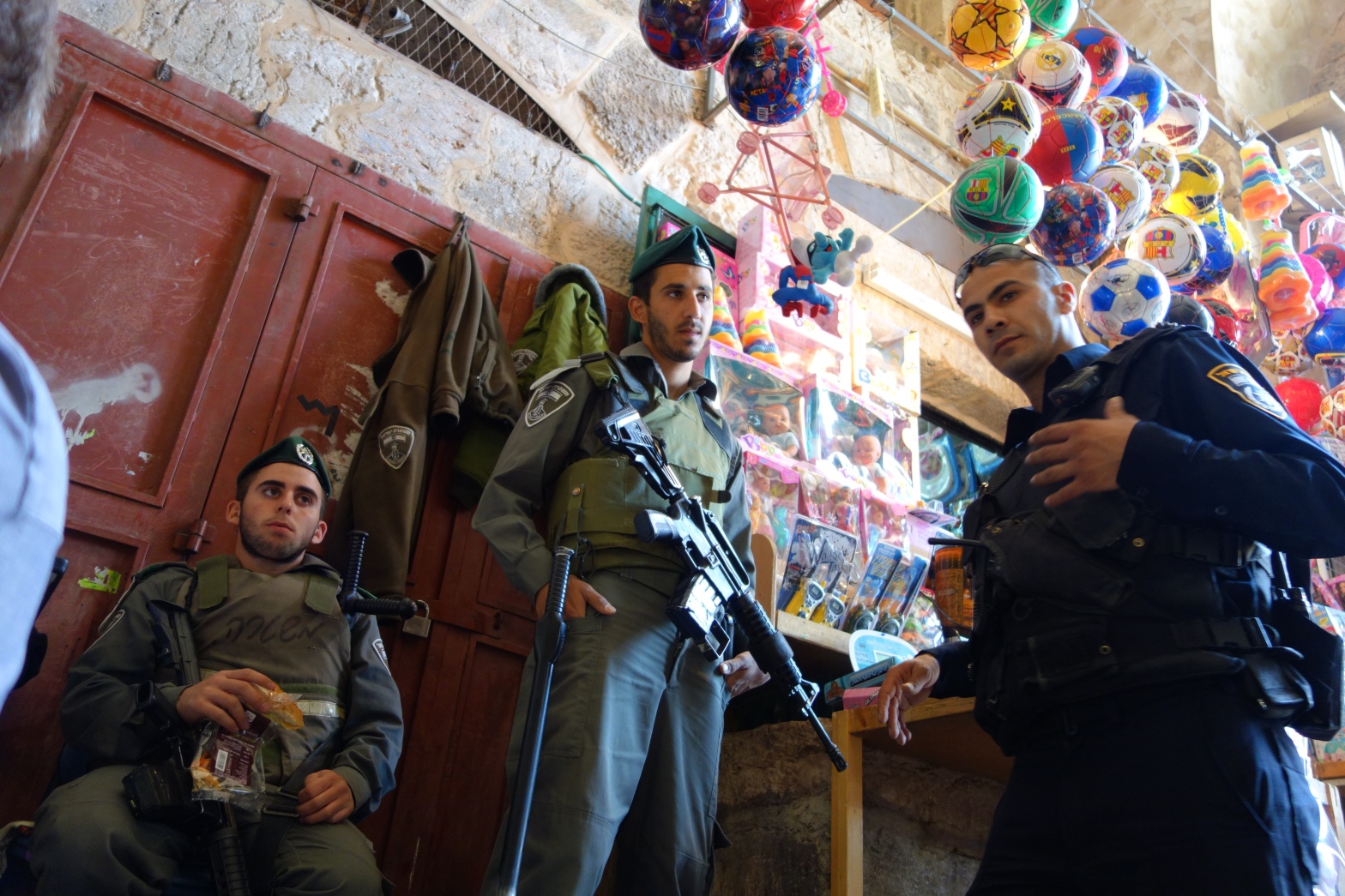For the last month, I’ve been struggling over what I wanted to share regarding my experiences in Israel. While impactful and moving moments made the travel experience rich at times, I sensed a persistent tension and distrust throughout the country. It was a low-lying and lingering fog–cold, eerie, barely visible, yet permeating nearly every location, event, and aspect of life. In reflecting on my emotions and reactions to my time in this new yet historic country, I still find myself conflicted. A trip here let’s you check off lots of Life List dreams, but at the same time, this is the most uncomfortable, and sometimes unwelcome, I’ve ever felt in my travels. I’ll be processing this whole experience for a long time to come.
As with any of my articles, my perception is my own, and it may not reflect the opinions or viewpoints of others. I say that, not so much for you, the reader, but as a reminder to myself that I’m just a beginner when it comes to the complexities of Israel. I can only share my experience: what I saw, how I was treated, and how all that made me feel. But I recognize that there’s a richness and depth that I can one day better explore.

Over the course of a few days–as my partner Rick and I made our way from Tel Aviv to the north, from Galilee to Golan, through the West Bank and into Jerusalem–we were inundated with multi-faceted layers of history, architecture, culture, politics, and religion. And we were struck by the physical beauty of the country, its coastal vistas, ancient architecture, Roman ruins, and lush countryside.

My inner Catholic thrived in Israel. I couldn’t anticipate how strongly I would be affected, but I was hopeful for some kind of spiritual connection to the Holy Land, and I was bountifully rewarded. In Galilee, as we sat by the waters upon which Jesus walked and where he gave the Sermon on the Mount, our guide Benny read to us from the Bible. To hear those words that I have listened to virtually every Sunday of my life in the place where those stories happened over two thousand years ago was powerful. Somehow, there, in that moment, my religion was suddenly more tangible…more real.

In Jerusalem, at the Church of the Holy Sepulcher–which marks the place of the Crucifixion, I felt compelled to touch the slab of stone believed to be the location where Jesus’ dead body was prepared for the tomb. Being in that space with fellow believers, sharing that moment with my partner, appreciating how fortunate I was to be there at all, and recognizing that, according to my faith, I am saved because of what Jesus did for us all, I released my burdens in the form of countless, uncontrollable tears. I felt humbly small, unworthy of such love. And then I felt suddenly light, as though those burdens had truly been removed, freeing me to reflect the love Jesus bestowed upon me with all the world. A Christian, standing where Jesus died for our salvation, feels immensely grateful.

Visiting Jewish sites like the Western Wall–the last remnant of the wall that surrounded the Temple of Solomon and now the most sacred Jewish site–intrigued and moved me, too. It’s that celebration of one-ness that I love about travel. Just as I had felt in Egypt when witnessing Muslims praying in mosques, seeing how Jews expressed their devotion and faith at this holy place convinced me once again that regardless of any differences people might have theologically, spiritually, politically, or personally, our humanity and our divinity binds us together.

That’s why a place like Yad Vashem is such an important place to visit (watch Rick Steves’ video about the Children’s Memorial at Yad Vashem). As the official Israeli memorial to Holocaust victims, this place invites visitors to not only remember those who suffered at the hands of the Nazis, their collaborators, their helpers, and their rescuers, but to humanize all of them. Articles of clothing, children’s games, love letters, video testimonies made powerful testaments to lives lived, lives destroyed, and lives saved. The goal: for all of us to learn from the mistakes, atrocities, and sufferings of the past to prevent and eliminate them from our present and our future…a lesson with which our world continues to struggle.

However, for me, these beautiful and poignant moments were heavily shadowed by the pervasive tension I felt wherever we went. The borders between Israel and its neighbors like Lebanon and Syria are understandably well defended. But even within the country and within the walls of Old Jerusalem (a holy space where the three major monotheistic religions converge), distrust feels engrained in the society. People take circuitous routes through the city to get from point A to point B just to avoid different religious neighborhoods. Young Israeli soldiers armed with automatic weapons stand guard at an entrance near the Cotton Market to decide who can go to the Temple of the Rock (through this entrance, Muslims, yes. Jews and all others, no–presumably for their own protection and in accordance with Orthodox Jewish doctrine that forbids Jews to enter what once was the Holy of the Holies). Their colleagues do the same at multiple checkpoints for entrance into and exit out of the West Bank. The prison-like walls (graffitied with anti-Israeli settlement comments) and fences that divide Israel and the Palestinian Territories seem to be more than their mere physical defenses–they’re powerful symbols of what keeps the Israelis and Palestinians on opposite sides of the same problem. Like it or not, their fates are intertwined, and breaking down barriers instead of creating them may be a better solution than the status quo.


There were times when I felt unwelcome. In a strongly conservative, Orthodox neighborhood–where women are required to wear dark skirts or dresses, married women cover their hair with either cloth or a wig, and where men dress in virtually identical black suits, black hats, and beards –I felt like a scarlet-lettered harlot for wearing jeans and a ponytail in this stark, monochromatic part of town. I even got the stink eye from little seven-year-olds.
And at the airport, I spent over an hour with various security agents who escorted me from one checking station to the next to the next and to the next, meticulously examined my luggage and sorted through its contents four times, and repeatedly asked me questions about my past and future travels. Female guards felt me up two separate times while checking for “suspicious items” on my person (I almost felt like I should pay the women for such personal services). I didn’t know if this was standard procedure or if I was just special, but a taste of this raised new sympathies in me for anyone who is deemed dubious by authorities.
For the peoples who call this land home, the complex and deep-seated issues from ages past are compounded by the grim, and sometimes dangerous, complications of today. Blame and fear motor endless cycles of revenge, self-defense, attack, and more defense. And the questions raised are as old as time: what belongs to whom, who was first, who started it, who is right, who’s to blame? These spiraling questions make me think of a dog chasing its own tail or barking at its reflection in the mirror. Workable answers to the problems have eluded everyone, but I wonder whether these are even the right questions to ask. Do they bring anyone closer to a solution or do they just breed more animosity?

Perhaps the answers rest with future generations. One of our last experiences was joining our friend Uri and his beautiful family for an Israeli Independence Day barbecue in their home. Being welcomed so warmly and sharing in a bountiful meal with locals, Rick and I felt so blessed. Uri’s beautiful daughters–both in their 20s–openly shared stories about love, friends, work, travel, politics, and religion. The family is Jewish Israeli, but they have roots in Morocco, Libya, Turkey, and Russia. They incorporate secular and non-Jewish religious traditions from those countries into their everyday lives. The eldest daughter, Shani, was recently married and wove elements of her diverse heritage (and her husband’s) into the wedding celebrations.
When we asked Shani and her sister Adi about their hopes for the future of their country, both confidently replied that respect and understanding of the plight of Palestinians is growing in their generation. They recognize that current political “solutions” aren’t working and that a sensible alternative is not found in the extremes, but somewhere in the middle.

Feeling well nourished from the abundant feast and appreciative of the time spent with this Israeli family on their country’s Independence Day, we all laughed as the father brought in yet another plate of grilled chicken for us. With happy smiles, we patted our overstuffed bellies. Uri understood our gratitude and contentment. Uri smiled back and thanked us for coming into his home to get to know his family. Looking to Rick and I, then to his daughters, he shared some fatherly wisdom–“Reaching towards each other with open palms is more productive than with closed fists.”


Trish, what a thoughtful and honest essay. That’s not easy and it is very insightful. Nice writing.
Thank you, as always, for your support, Rick. I’m grateful we shared this journey together.
As usual — absolutely LOVE your insights! Thanks for sharing!
Thank you, Jaclyn! I hope all is well with you and everyone at Pink Pangea!
Trish, thank you for your thoughtful commentary. I have been blessed with traveling to Israel twice and have also undergone the intense scrutiny at the airport. In retrospect, it was a very interesting cultural experience. At the time, it was not. How wonderful to feel the connection with your faith! It was an awesome experience for me also and I hold it dear to this day. Thank you for sharing your experiences.
Barbara, thank you! I’m glad to hear that you had powerful experiences in Israel. It must certainly give you lots of food for thought and fond memories. Take care!
Beautiful, beautiful piece! I can certainly imagine you crying your heart and soul out in the Holy Land! What blessings! Continue to grow!
Luv,luv,luv!
Thank you for this beautiful essay. I almost teared up when you described your moment of grace and peace in the Holy Land! I am a Muslim and I can only imagine the overpowering emotion of visiting such sacred places, be they Christian, Jewish or Muslim holy sites (many, of course, a combination!). I hope in my lifetime that it becomes a place we can all worship our God in, peacefully and as friends. InshaAllah.
Thank you for reading the post and for your comments. I agree with you–no matter which religion guides our lives, when we can go beyond our own perimeters and (with a basic level of respect and earnest hope for understanding) venture into the lands and sites that other cultures hold sacred, it can be awe-inspiring. And when they converge in one place, it behooves us to find a way to make it work…peacefully.
Hello,
I came across your blog by chance and it was interesting to read you thoughts. I’m an Israeli Jew living in Jerusalem – in west Jerusalem or the Israeli/Jewish part. I understand why for an outsider the security personnel, the security wall, checkpoints etc. are a bit too much. I can tell you from an Israeli point of view that most Israelis don’t live or travel to the west bank so this tension is not something that most Israelis live with. Regarding the old city, even though I live 20 minutes walk from the old city I never went alone or hardly at all to the Muslim quarter and only into the touristic places of the Christian quarter because there is a danger to Israeli Jews there – and many Israelis were stabbed or Attacked in other ways in Arab areas in Jerusalem.
Regarding the conflict between Jews and Arabs it is a conflict that is so complicated that I doubt will be ever resolved. I believe a compromise is the only solution that is possible but I’m afraid most Arabs are against a compromise. I think that east Jerusalem should be under Arab control (except for the western wall) but most Palestinians are against the two state solution and are against the right of a Jewish state to exist at all on a land that they view as theirs.
To them Jaffa, Acre, Haifa, the Galilee etc. are all part of their Palestine.
So I don’t see how there ever will be peace.
It will take a major change in the Palestinians society to make them look at the history of the land in a new way and be willing to acknowledge that their decades long narrative is maybe not the whole story. I don’t see this happening and so there’s this endless conflict of two parties fighting for the same land. One party – the Israelis is willing to reach a compromise. The other party – the Palestinians, want the whole land to themselves and the destruction of Israel. that is what fueling the conflict – the desire of the Arabs to have all the land to themselves, and us Israelis destroyed.
Thank you for sharing your perspective. As I was a first-time visitor to Jerusalem, there was much to take in and there is still so much for me–and for so many others–to learn. It is important to remember that stories are never one-sided, that perspectives differ (even within the same party), and that hope is not lost if there are those who are willing to work for a solution. During my trip and since, I have met Jewish Israelis, Arab Israelis, and Palestinians who do believe that a solution is possible. Not everything is so black and white, so absolutely hopeless. Eventual peace may come at a high price, but eternal strife will be detrimental to everyone involved. I hope and truly pray that open-minded people will continue to work for the peaceful solution and not give in to pessimism, fear, and anger.
Beautifully written, Trish. Thank you for sharing your personal emotions and thoughts. Your words and the wisdom shared by your friend Uri are so very moving. May I share this post with friends and family that I know will be moved by and appreciate your experience?
Thank you, Gayla. I am grateful that you would take the time to read this and that you are interested in sharing this. By all means, please share this with as many people as you can.
You can send them to the website:
http://www.thetravelphile.com
You can give them direct link to the article:
https://thetravelphile.com/2013/06/08/struggling-with-israel/
Or you can have them check out The Travelphile Facebook page:
http://www.facebook.com/TheTravelphile
Thank you so much for your encouragement, support, and willingness to share this with your friends and family. Take care!
Thanks for the links, Trish.
Love your new cover photo of the Duomo. Gorgeous!
Thanks, Gayla!
This was really, really well written and the photos are amazing. Thanks for sharing your experience.
Thanks, Kelly. It means a lot to me that you took the time to read this and to drop me a message. I’m really grateful and humbled by your comments. Miss you and I hope to see you when I get back!
Beautifully written~ I truly appreciate not only the description of the sights and sounds, but the heart of your experience. Brings to mind my own travels to sacred places and the mixed emotions that arise in our experience of both the beauty and the woundedness of humanity.
(Gayla’s sister)
Thank you, Adrianne. Travel can connect us with humanity in ways that so many other things cannot. I’m so grateful for the opportunities I’ve had to go beyond the perimeters of my hometown and my TV to see with my own eyes how other people celebrate their culture and sometimes struggle with it. I’m glad you’ve had similar opportunities–the more we travel, the more we grow.
I really liked your thoughts and to hear your experiences with this region. At first I wasn’t going to respond, but I think I should. I have spent months in Palestine and from what I’ve seen and experienced it makes me sad that a group of people (Palestinians) have to live under such horrible conditions. Yes, Israelis don’t have a need to come to Palestine and actually there are huge signs when entering Palestinian cities/villages that Israeli citizens are not allowed and can be arrested at any time. However, they for whatever reason feel it’s fine to put settlements all over the west bank (not talking about Jerusalem) and by the way all settlements are illegal according to International law and the United Nations. Israel offers them at a really low price as a way of encouraging Israelis to move there. Ok, Palestinians do want a 2 state solution, no doubt about that, and they really are ok with the borders that they have and they don’t ever have the idea to “destroy” anything. I really hope one day they achieve this. It is really sad that the roads to the settlements are perfect for the Israelis and that Palestinians are not allowed to travel on them. I am always so scared to drive from Hebron to Ramallah because there are no guardrails or street lamps on the steep hills. Not much regard or care is left for the other side. No malls, no name brand of anything, no movie theaters so everything is restricted. why? because Israelis don’t allow it. I’m not against Israel don’t get me wrong and I know Palestine is not a great place to visit, there isn’t much to see or do, but people need to know Palestine isn’t a bad place it’s just what happens when you are being occupied. I’m a sociology major and I get it. Inequality, discrimination and everything else you can imagine happens here in the West Bank and it’s a horrible thing to watch daily. Checkpoints really? everywhere? yes, and I’m not talking about the normal checkpoints between Israel and Palestine I’m talking about all the unnecessary checkpoints within the West Bank between Palestinian towns. Even today there were extra checkpoints they just spring out of nowhere and suddenly there are soldiers everywhere, everyone is treated as if they are a criminal.
I know not much is really known about the Palestinian life and how it is over here, this is why I felt I needed to leave a comment. Besides a thousand years ago everyone lived peacefully so it is definitely possible again.
Thanks for your response, Allison. I’m glad you took the time to share your experience. My time there was short-lived so I realize that I don’t get to see the whole picture, but I’m grateful that I had the chance to go there at all and observe with my own eyes how things can be. I hope others go there with the intent of looking at the situation from various sides and discovering new truths. That’s why I’m thankful that you share your observations–it’s important to let others know the deeper stories that often elude us in the media.
This trip is not completed without visiting Gaza (at least), and without seeing how people suffer in that place. There are no significant buildings of history there to see, to admire or just visit, since it’s all destroyed in heavy bombing, but there are many significant people in Gaza, trapped in ghetto.
At the time–and as it continues to be true now–traveling to Gaza was not a possibility for us, due to time constraints and safety concerns. Our hearts go out to anyone who suffers, whether that be because of personal anguish or external situations such as famine, poverty, war, anger, or oppression. While we cannot always get a “complete” perspective on all situations, it’s always best to do the best that one can.